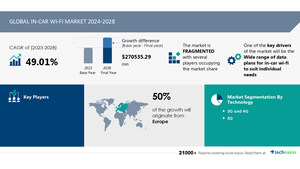NEW YORK, July 5, 2024 /PRNewswire/ -- The global RFID blood refrigerator and freezer market size is estimated to grow by USD 498.3 million from 2024-2028, according to Technavio. The market is estimated to grow at a CAGR of 21.49% during the forecast period. High demand for blood and blood components is driving market growth, with a trend towards increasing initiatives to raise awareness about blood donations. However, compliance with medical guidelines and declining number of blood donors poses a challenge. Key market players include Angelantoni Industrie Srl, Azenta Inc., Biomed Global, Bionics Scientific Technologies Pvt. Ltd., Cardinal Health Inc., CIMSENSE, Haier Smart Home Co. Ltd., IQM AS, PHC Holdings Corp., REMI Group, Rollex Group Australia PTY Ltd., Spacecode SA, Terso Solutions Inc., Thalheimer Kuhlung GmbH and Co. KG, and Trane Technologies Plc.
Get a detailed analysis on regions, market segments, customer landscape, and companies- View the snapshot of this report
Rfid Blood Refrigerator And Freezer Market Scope |
|
Report Coverage |
Details |
Base year |
2023 |
Historic period |
2018 - 2022 |
Forecast period |
2024-2028 |
Growth momentum & CAGR |
Accelerate at a CAGR of 21.49% |
Market growth 2024-2028 |
USD 498.3 million |
Market structure |
Fragmented |
YoY growth 2022-2023 (%) |
17.41 |
Regional analysis |
North America, Europe, Asia, and Rest of World (ROW) |
Performing market contribution |
North America at 42% |
Key countries |
US, Germany, Canada, China, and UK |
Key companies profiled |
Angelantoni Industrie Srl, Azenta Inc., Biomed Global, Bionics Scientific Technologies Pvt. Ltd., Cardinal Health Inc., CIMSENSE, Haier Smart Home Co. Ltd., IQM AS, PHC Holdings Corp., REMI Group, Rollex Group Australia PTY Ltd., Spacecode SA, Terso Solutions Inc., Thalheimer Kuhlung GmbH and Co. KG, and Trane Technologies Plc |
Market Driver
The global RFID blood refrigerator and freezer market is experiencing growth due to the increasing number of blood donations worldwide. With rising awareness campaigns encouraging individuals to donate blood, more hospitals, clinics, and blood banks require efficient storage and tracking solutions for blood and blood components. RFID technology offers these benefits, making it an essential investment for healthcare organizations. The awareness initiatives, such as the Voluntary Blood Donation Programme and Platelets Across America, aim to inspire new donors and maintain a strong donor population. Regular donations are crucial to ensure high-quality blood stocks, and RFID technology enables effective inventory management. Organizations like the Red Cross and corporate companies are partnering with recognized blood banks to organize blood donation drives and set up camps. These efforts will lead to a significant increase in blood donations, boosting the demand for RFID blood refrigerators and freezers during the forecast period.
The Rfid blood refrigerator and freezer market is witnessing significant growth due to the increasing demand for efficient and safe storage solutions for blood components and plasma derivatives. Hospitals and diagnostic centers are major consumers of these systems, used for storing various types of blood components, including plasma samples, platelets, and leukemia, thalassemia, and hemophilia-related components. Rfid technology enables easy identification and tracking of blood tubes and platelet components through the use of identification cardholders. These systems come in various configurations, including upright and drawer racks, made of corrosion-resistant steel for durability. Key features include motors, thermostats, condensers, expanders, and evaporators, ensuring consistent temperature control within the cold chain. Emergency power systems provide backup during power outages. Cost-effective and energy-efficient, these systems are essential for blood donation centers, laboratories, and blood banks, contributing to the overall success of the blood storage and transfusion supply chain. Quality control is paramount, with systems adhering to stringent standards for blood safety and preventing bloodborne pathogens. Applications extend beyond hospitals and diagnostic centers, with potential in research and other industries. The market is expected to grow at a steady pace, driven by the increasing prevalence of chronic diseases and the need for advanced blood storage solutions.
Discover 360° analysis of this market. For complete information, schedule your consultation - Book Here!
Market Challenges
- The RFID blood refrigerator and freezer market faces challenges due to decreasing blood donations in the US. With over 15 million blood transfusions performed annually for major surgeries and medical conditions, the need for blood storage solutions remains significant. However, factors such as lack of awareness, time constraints, and inadequate knowledge about blood donation locations and schedules have led to a decrease in donations since the COVID-19 pandemic, impacting the market negatively. Additionally, high blood unit costs and fewer Medicare reimbursements, as well as the adoption of minimally invasive surgeries, further hinder market growth. Compliance with stringent medical norms adds to the complexity and cost of blood storage, making it essential for market players to innovate and offer cost-effective solutions to attract customers.
- The Rfid blood refrigerator and freezer market cater to diagnostic centers, blood banks, and laboratories, addressing the need for efficient and safe storage of vital medical samples like plasma, platelets, and blood for chronic diseases such as Leukemia, Thalassemia, and Hemophilia. Rfid technology enables automated identification and tracking of samples using cards or tags. These units are designed with corrosion-resistant steel, ensuring durability in harsh environments. The market includes various types like drawer racks and single door models, catering to different applications and country-level requirements. Cost-effective solutions are essential for blood donation programs and plasma collection centers. Quality control is paramount, with cold chain maintenance and supply chain management crucial for blood storage and transfusion services. Rfid technology aids in blood safety by reducing human error in labeling and tracking, ensuring bloodborne pathogens are minimized during blood transfusion, testing, donor screening, and processing. This technology plays a significant role in transfusion medicine, hematology, and bloodborne diseases research, contributing to the overall advancement of healthcare services.
For more insights on driver and challenges - Request a sample report!
Segment Overview
This rfid blood refrigerator and freezer market report extensively covers market segmentation by
- Application
- 1.1 Hospital and diagnostic centers
- 1.2 Blood banks
- 1.3 Others
- Type
- 2.1 RFID refrigerators
- 2.2 RFID freezers
- Geography
- 3.1 North America
- 3.2 Europe
- 3.3 Asia
- 3.4 Rest of World (ROW)
1.1 Hospital and diagnostic centers- Hospitals and diagnostic centers have seen significant growth due to increasing medical needs and expanding services. In hematology, surgical procedures and regular transfusions for conditions like cancer and hemophilia drive the demand for RFID blood refrigerators and freezers. Multispecialty hospitals and hospital groups, offering various inpatient and outpatient services, generate substantial revenues and are major contributors to this market's growth. The RFID technology ensures efficient tracking and monitoring of blood products, contributing to improved patient care and safety. With the rise in hospital admissions and diagnostic procedures, the need for advanced storage solutions is increasingly important, making the RFID blood refrigerator and freezer market a promising investment opportunity.
For more information on market segmentation with geographical analysis including forecast (2024-2028) and historic data (2017-2021) - Download a Sample Report
Research Analysis
The Rfid Blood Refrigerator and Freezer market encompasses advanced refrigeration and freezing solutions designed specifically for storing and preserving blood components, plasma derivatives, and other vital medical materials. These systems utilize Radio Frequency Identification (Rfid) technology for efficient tracking and monitoring of stored items, ensuring the integrity of the cold chain and maintaining optimal temperatures. Key features include tubing and capillary tubes for easy access, condensers, expanders, evaporators, thermostats, and various configurations to accommodate different blood components and configurations. Motors, emergency power systems, and corrosion-resistant steel ensure reliable and consistent operation. Hospitals, diagnostic centers, chronic disease treatment centers, and blood banks are primary consumers, utilizing these systems for storing plasma samples, platelets, and other blood components for transfusion, blood testing, donor screening, and blood processing. Rfid technology enables seamless identification and tracking of blood tubes and donor identification cardholders, enhancing blood safety and reducing the risk of bloodborne pathogens. The market continues to grow due to the increasing demand for advanced blood transfusion and hematology services, including the treatment of conditions such as leukemia, thalassemia, hemophilia, and other chronic diseases. Quality control measures and supply chain optimization further drive the market's expansion, ensuring the delivery of safe and effective blood components for transfusion medicine.
Market Research Overview
Rfid blood refrigerators and freezers are specialized medical equipment designed for storing and preserving blood components and plasma derivatives at precise temperatures. These systems utilize RFID technology for identification and tracking of blood tubes, capillary tubes, and other components. Key features include condensers, expanders, evaporators, thermostats, and various configurations. Motors and emergency power systems ensure uninterrupted operation. Applications include hospitals, diagnostic centers, and blood banks for storing platelet components, plasma samples, and platelets. Made of corrosion-resistant steel, these systems offer drawer racks and identification cardholders for efficient organization. Cost-effective and reliable, they ensure quality control in the cold chain and supply chain for blood storage, transfusion, testing, donor screening, processing, and safety against bloodborne pathogens in transfusion medicine, hematology, and bloodborne diseases.
Table of Contents:
1 Executive Summary
2 Market Landscape
3 Market Sizing
4 Historic Market Size
5 Five Forces Analysis
6 Market Segmentation
- Application
- Hospital And Diagnostic Centers
- Blood Banks
- Others
- Type
- RFID Refrigerators
- RFID Freezers
- Geography
- North America
- Europe
- Asia
- Rest Of World (ROW)
7 Customer Landscape
8 Geographic Landscape
9 Drivers, Challenges, and Trends
10 Company Landscape
11 Company Analysis
12 Appendix
About Technavio
Technavio is a leading global technology research and advisory company. Their research and analysis focuses on emerging market trends and provides actionable insights to help businesses identify market opportunities and develop effective strategies to optimize their market positions.
With over 500 specialized analysts, Technavio's report library consists of more than 17,000 reports and counting, covering 800 technologies, spanning across 50 countries. Their client base consists of enterprises of all sizes, including more than 100 Fortune 500 companies. This growing client base relies on Technavio's comprehensive coverage, extensive research, and actionable market insights to identify opportunities in existing and potential markets and assess their competitive positions within changing market scenarios.
Contacts
Technavio Research
Jesse Maida
Media & Marketing Executive
US: +1 844 364 1100
UK: +44 203 893 3200
Email: [email protected]
Website: www.technavio.com/
SOURCE Technavio

WANT YOUR COMPANY'S NEWS FEATURED ON PRNEWSWIRE.COM?
Newsrooms &
Influencers
Digital Media
Outlets
Journalists
Opted In





Share this article